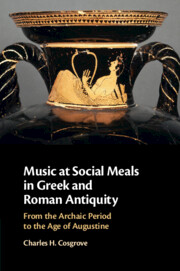Book contents
- Music at Social Meals in Greek and Roman Antiquity
- Music at Social Meals in Greek and Roman Antiquity
- Copyright page
- Dedication
- Contents
- Figures
- Glossary of Musical Instruments
- Abbreviations
- Introduction The Topic and the Sources
- Chapter 1 Sympotic Scenes and Songs
- Chapter 2 The Gentleman’s Lyre
- Chapter 3 Hellenistic Evolutions
- Chapter 4 Poets and Musicians at Upper-Class Greek Banquets
- Chapter 5 Music and Elite Dining in the Roman Age
- Chapter 6 Music at the Social Recreations of the Lower Classes
- Chapter 7 Music at the Suppers and Feasts of the Jewish People
- Chapter 8 Music at Christian Social Meals
- Chapter 9 Purposes and Pleasures
- Bibliography
- Index Locorum
- Subject Index
Chapter 2 - The Gentleman’s Lyre
Published online by Cambridge University Press: 18 November 2022
- Music at Social Meals in Greek and Roman Antiquity
- Music at Social Meals in Greek and Roman Antiquity
- Copyright page
- Dedication
- Contents
- Figures
- Glossary of Musical Instruments
- Abbreviations
- Introduction The Topic and the Sources
- Chapter 1 Sympotic Scenes and Songs
- Chapter 2 The Gentleman’s Lyre
- Chapter 3 Hellenistic Evolutions
- Chapter 4 Poets and Musicians at Upper-Class Greek Banquets
- Chapter 5 Music and Elite Dining in the Roman Age
- Chapter 6 Music at the Social Recreations of the Lower Classes
- Chapter 7 Music at the Suppers and Feasts of the Jewish People
- Chapter 8 Music at Christian Social Meals
- Chapter 9 Purposes and Pleasures
- Bibliography
- Index Locorum
- Subject Index
Summary
The group music-making at aristocratic symposia, described in Chapter 1, developed in a sixth-century social context where ordinary people (the demos) were gaining power in ways that threatened elite claims to superiority and oligarchic right to rule. In this cultural environment, sympotic music-making by upper-class men, “gentlemanly lyrody,” served as a symbol of the superiority that elites arrogated to themselves and expected ordinary people to respect. The ability to perform a certain repertoire to self-accompaniment was a badge of social superiority. This lyrody was directly connected to the refined education that aristocratic boys received; when practiced at adult men’s symposia, it represented a display of paideia. The chapter also examines the question of whether nonelites eventually acquired the skills and repertoire of gentlemanly lyrody, which might have robbed it of its social cachet; and what happened to that cachet when increasing numbers of professional musicians came to dominate the entertainment scene, offering a popular new music for the stage that eventually entered the drinking party. The chapter also considers evidence that some elites did not participate in the sympotic musical culture of their class.
Keywords
- Type
- Chapter
- Information
- Music at Social Meals in Greek and Roman AntiquityFrom the Archaic Period to the Age of Augustine, pp. 63 - 100Publisher: Cambridge University PressPrint publication year: 2022

